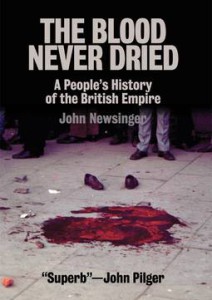This year is seeing a veritable frenzy of spectaculars encouraging the sad old supremecist idea that Being British is something to be jolly well/fucking proud of, what with all our institutions and history and achievements. Our diversity in particular has been cited as a significant reason we got lumbered with the Olympics and the French didn’t. Anybody wishing to read something that presents a less uncritical evaluation of these ideas and an unsanitised history of some of the “achievements” that gave rise to them, could do no better than read “The Blood Never Dried”. Subtitled “A People’s History of the British Empire” and taking its title from Chartist radical Ernest Jones 1851 evaluation “on its colonies the sun never sets but the blood never dries”, it details the global theft and fraud, violence and murder with which this little country enriched itself at the expense of everybody else. With an admirable balance of restraint and anger, John Newsinger constructs a roughly chronological sequence of chapters that detail what it was like to be exploited by the British from the Carribean to Iraq, along the way reminding us of overlooked capitalist adventures in China (“The British Empire was the largest drug pusher the world has ever seen”), and racist repression in Kenya (“flogging, torture, mutilation, rape and summary execution of suspects and prisoners were everyday occurences”), banking scandals in Egypt and military interventions in Indonesia (re-arming Japanese prisoners to fight against a national liberation movement in order to restore Dutch rule!). But as well as detailing the oppression, this book also records the resistance, presenting for example a fuller description of the widespread nature, scale and politics of the Indian resistance to British rule that undermines the simpler and cosier notion that the Bristish quit India primarily because of Mahatma Gandhi’s campaign of non-violence, some sort of high moral response to a high moral position. The book pays tribute to the struggles of Indian trade unionists and revolutionaries overlooked in this accepted narrative (“In Ahmedabad 100,000 textile workers struck for nearly four months”) and is deeply critical of the Labour Party’s practical commitment to and engagement in anti-imperialism. The Labour Government made every effort to make sure its final withdrawal from India took place under conditions that were as favourable to British interests as possible, and ensured India remained a neo-colonial resource. Newsinger makes the point that, from the Attlee government’s decision to arm this country with nuclear weapons in 1947 to Blair government’s decision to involve this country in the invavsion of Iraq in 2003, the overwelming reason for these policy decisions is a belief that siding with the US is the best way to protect Britain’s global, or old imperialist, interests.
“The Blood Never Died” presents a highly readable history of Empire, seen from the underside of the imperial experience. The book perhaps lacks an overall linking chronology or framework that describes the political and economic development of this monstrosity – for an account of a global insititution, it presents itself through a series of particular geographical chapters, rather than as a linked narrative. But that’s a minor point, and probably a more academic and comprehensive account would inevitably produce a larger, but less immediately engaging work.
Written largely as a response to the revisionists and apologists for empires whose writings attempted to sanitize the invasion of Iraq, the book remains essential reading, particularly so in this year of Jubilympics.
Reviewed by Robb Johnson

Geoff Winde
Hello, could you recommend any books that make up for what this book, ‘lacks an overall linking chronology or framework that describes the political and economic development of this monstrosity …’
Thank you
Geoff